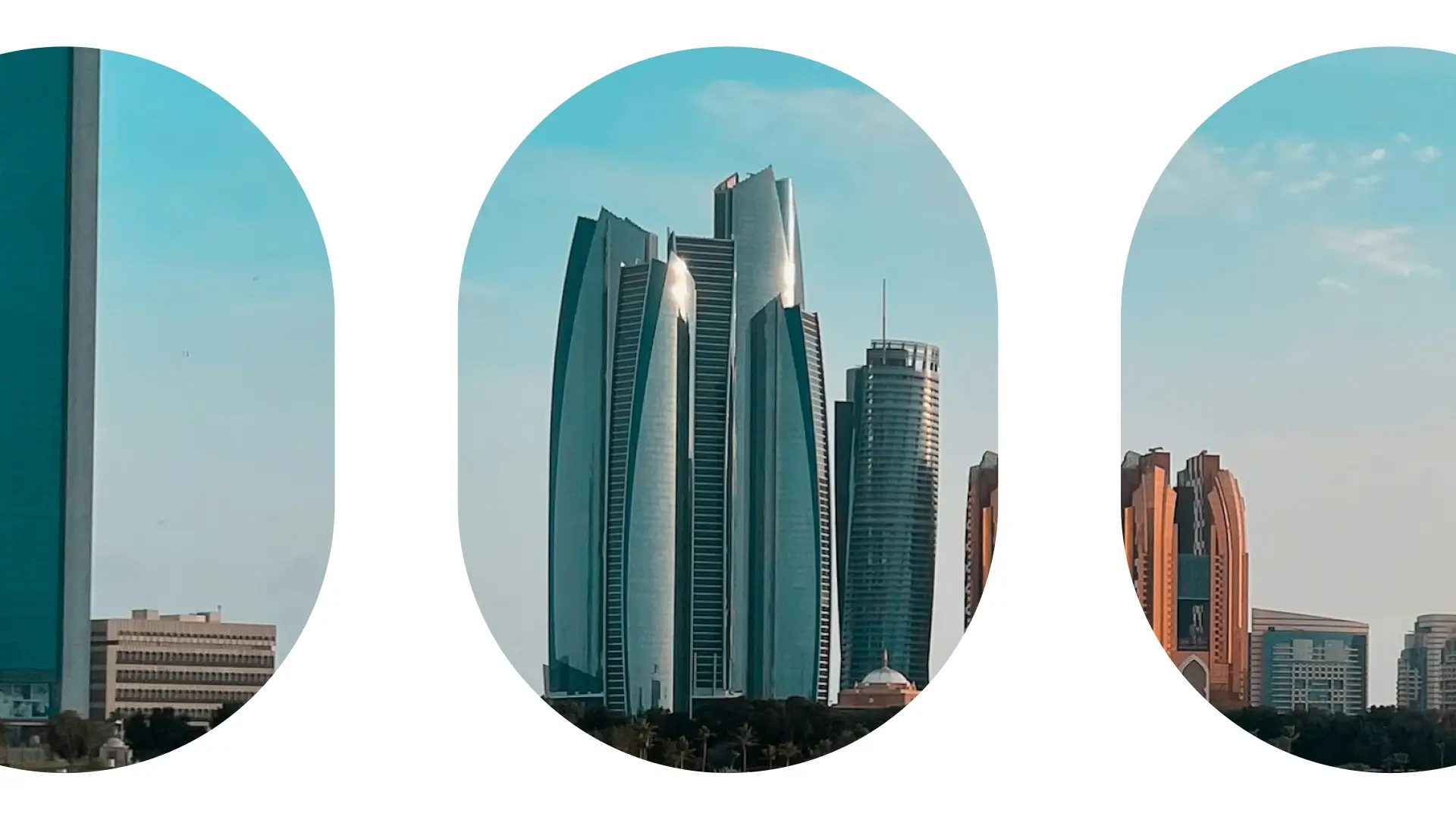The United Arab Emirates (UAE), a federation of seven emirates on the Arabian peninsula, has rapidly developed into a global hub for business and tourism. With its strategic location, modern infrastructure, and vibrant economy, many are drawn to live and work in the UAE–but is it somewhere you should hire from?
Yes, in short. Boasting a population of approximately 10 million people, the UAE is an exciting melting pot of cultures and traditions. Emiratis, the native population, make up only about 11% of the total population, with the rest being expatriates from all corners of the globe.
Thanks in part to its international perspective, the UAE is a major player in sectors such as technology, finance, and real estate, attracting highly skilled professionals from around the world. The country’s emphasis on innovation, coupled with its investment in education and training, has cultivated an ambitious workforce. Whether it’s in the arts, sciences, or business, the UAE offers a pool of talent that is ready to contribute to global companies.
The working week typically runs from Sunday to Thursday, with Friday and Saturday being the weekend. Despite a demanding work environment, the UAE places importance on maintaining a balance between work and personal life. The government has implemented labor laws that protect workers’ rights and ensure their well-being, making the UAE an attractive place to work and live.
The benefits of doing business in the UAE
Still not convinced? Let’s throw on the afterburners. The UAE is a global leader in the oil and gas industry, with the sector accounting for 30% of its total GDP and placing it among the world’s top ten oil producers. Its oil reserves stand at around 100 billion barrels, demonstrating the significant role the UAE plays in the global energy market and the vast employment opportunities it provides in this sector.
Beyond energy, the UAE is increasingly diversifying into a trade-oriented logistics and supply chain leader, with the services sector, particularly in Dubai, becoming well established. Indeed, the sector contributes around 50% of the country’s GDP, a contribution that has required the cultivation of many skilled professionals to service it. The UAE has also developed large port facilities and free trade zones to attract both manufacturing and services, which in turn brings more professionals into the country.
If you’d like to get a hold of these workers, look no further than our competitive global employment platform, which features country-specific pricing so you can be sure to get the best deal whether you’re hiring in the UAE or beyond! The Multiplier platform makes the process effortless, with contract generation possible in under five minutes (seriously, we’ve timed it).
Other nuances for businesses to note when hiring in the UAE include the construction of attractive compensation packages. It’s crucial to get this right as offering the right employee benefits enhances retention, job satisfaction, and facilitates the attraction of top-notch Emirati talent.

We’ve still only scratched the surface of reasons to hire in the UAE. Here are three takeaways you need to understand about the Emirati workforce.
- Increasing Emirati Participation: The United Arab Emirates has been implementing a policy of Emiratisation, which aims to increase the employment of UAE nationals in both public and private sectors–in turn broadening the potential talent pool in the country. This initiative seems to be succeeding, with the Emirati private sector workforce rising by a third in 2023.
- Work-Life Balance Challenges: Despite the progress in employing Emiratis, 50% of Emiratis employed in the UAE private sector face work-life balance challenges and 69% believe that the UAE private sector offers less job stability, potentially providing opportunities for foreign companies to step in and snatch up talent.
- Foreign Workers: Still, the labor force of the UAE is primarily made up of immigrants–reflecting the UAE’s open labor market and its attractiveness to foreign workers seeking employment opportunities.
How does that sound? We know this is a lot of information to take into consideration. That’s why at Multiplier we pride ourselves on offering dedicated, 24/5 support tailored to specific countries–so you can sit back and relax in the knowledge that the professionals have things under control.
Now you’re speaking their language
Picture this scenario: you’ve hired and onboarded talent from the UAE, and now you’re wondering what makes them tick. Consider these tips for effective communication with your Emirati colleagues, starting with the stuff that helps no matter where they’re based:
- Clear Communication: Clearly communicate job expectations, company culture, and goals to ensure alignment. Regular check-ins and feedback sessions can help keep everyone on the same page.
- Leverage Technology: Use technology to facilitate collaboration and communication. Tools like Slack, Microsoft Teams, or Trello can help manage projects effectively.
- Integration: Make efforts to integrate remote workers into the company culture. Virtual team-building activities or occasional in-person meetings (if possible) can foster a sense of belonging.
- Legal Compliance: Ensure all employment contracts and practices comply with Emirati labor laws, even when hiring remotely. Luckily, with Multiplier, our easy-to-use platform ensures compliance is guaranteed, with automatic contract generation that dots the Is and crosses the Ts.
But, most of all, connecting with a colleague from a different country requires the human touch. Sport is always a good place to start a conversation. In the UAE, football holds a special place in many hearts, with the national team having competed at the 1990 World Cup (we won’t discuss how well they performed). Beyond football, the country is also host to the Dubai World Cup, an annual horse racing event, which has helped establish Dubai as a major hub for sports and entertainment. Motorsport, particularly Formula 1, is another popular fixture, with the Yas Marina Circuit being used for the Abu Dhabi Grand Prix.
Sport not tickling your colleagues fancy? Try culture. Here, the UAE has bags to offer, blending traditional Arabian customs and modern influences. On the one hand, the UAE is known for its traditional art forms like music, dance, poetry, pottery, weaving and embroidery. On the other hand, the UAE’s cities, notably Dubai and Abu Dhabi, are cosmopolitan hubs boasting ultramodern architecture, thriving arts scenes, and world-class dining and shopping experiences. So whether you’re interested in traditional Arabian culture or contemporary global trends, there should be something to bond with your Emirati colleague over.
Speaking the truth
Of course, if you really want to impress your new hire, you could try picking up some Emirati terminology. In Emirati culture, greetings play a significant role. The formal Arabic greeting is “as-salam alaykum“, which means “peace be upon you.” The standard response is “wa’alaykum as-salam,” translating to “and upon you, peace.” If you want to bid someone farewell, “Ma’a as-salaama” is a polite way to say “goodbye”.
When it comes to work-related speech, there are several phrases that might come in handy. One such phrase is “shukran“, which means “thank you,” and its response, “afwan,” meaning “you’re welcome.” Understanding these phrases can help foster better relationships with Emirati colleagues.
As for tech terminology, most tech-related terms are borrowed from English due to the prevalent use of the language in the tech industry. But here’s a few terms that might help, starting with “daeuna naltaqi ealaa Zoom”, which means, “let’s meet on Zoom.” Or how about “‘iirsaluha fi albarid al’iilikturunii”, meaning “send it in an email”. That should be enough to get you started!
Did you know?
Now that we’ve got the serious business out of the way, let’s have a quick look at some Emirati fun facts.
The United Arab Emirates (UAE) has a rich history that is deeply entwined with its geographical location on the Arabian peninsula. The UAE consists of seven emirates: Abu Dhabi, Dubai, Sharjah, Ras Al Khaimah, Fujairah, Ajman, and Umm Al Quwain. Before the discovery of oil, the region’s economy relied primarily on trade, with numerous powers competing over the territory.
When it comes to famous people, the UAE has its share of influential figures, many of them royals. Among the non-royals, however, special mention should go to Hazza Al Mansouri, the country’s first astronaut and the first Arab to travel to the International Space Station.
And now we reach the best bit: the food. Traditional dishes like Harees (a dish of wheat and meat), Machboos (a spiced rice dish), and Shawarma (grilled meat wrap) are popular across the country. But no discussion of Emirati cuisine would be complete without mentioning dates. They’re an integral part of the Emirati diet and are often served with Gahwa, a traditional Arabic coffee. Caffeine break, anyone?
Hungry for more UAE info?
We’ve got you covered! So far we’ve talked about the big picture, but our employment guide page contains all the nitty gritty information you need to make your UAE hiring plans an astronomical success. Click the link for details on statutory leave, public holidays, talent sourcing locations, and much, much more!
Taxes:
- Employers must contribute 12.5%.
Employee benefits:
- Social Security
- DEWS
- Health Insurances
- Maternal Leaves
- Hajj and Umrah Leaves
- Educational Leaves
- Allowances
Visa requirements:
- The employees who belong to GCC and the UAE will only need a work permit. However, other employees will need a residence visa and work permit sponsored by an established UAE entity employer.

Make international employment possible with Multiplier
And that’s the lowdown on hiring in the UAE. Now you’ve heard the benefits, make your dreams a reality with Multiplier. We’re here to help businesses boost their productivity with exceptional global talent, whether from the UAE or anywhere else.
Our presence in over 100 countries worldwide showcases the breadth of expertise we possess. Multiplier is a one-stop solution for all your global hiring needs, so why not talk to our experts and book a demo today?







